Russia ‘complicit’ in chemical attacks as refugees see ‘hope’ after Donald Trump’s missile strikes
RUSSIA, Iran and militia supporting Syria’s Bashar al-Assad have threatened to respond to any new attacks with aggression after Trump’s missile strike.
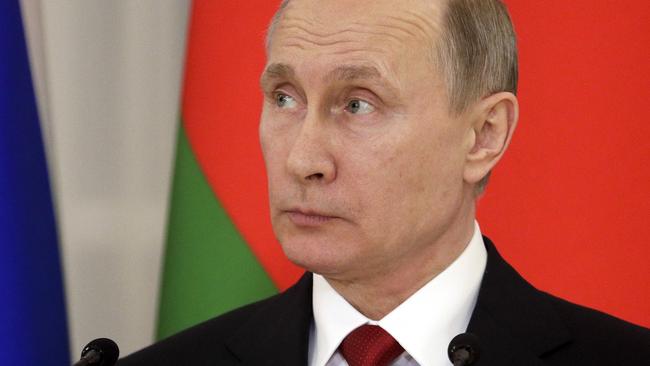
A JOINT command centre made up of the forces of Russia, Iran and militias supporting Syrian President Bashar al-Assad said the US strike on a Syrian air base on Friday crossed “red lines” and it would respond to any new aggression and increase its support for its ally.
The United States fired dozens of cruise missiles at a Syrian air base on Friday from which it said a deadly chemical weapons attack had been launched earlier in the week, escalating the US role in Syria and drawing criticism from Assad’s allies including Russia and Iran.
“What America waged in an aggression on Syria is a crossing of red lines. From now on we will respond with force to any aggressor or any breach of red lines from whoever it is and America knows our ability to respond well,” said the statement published by the group on media outlet Ilam al Harbi (War Media).
MALCOLM TURNBULL: Assad ‘has to go’ after gas attack
RELATED: US launches missile strikes on Syria
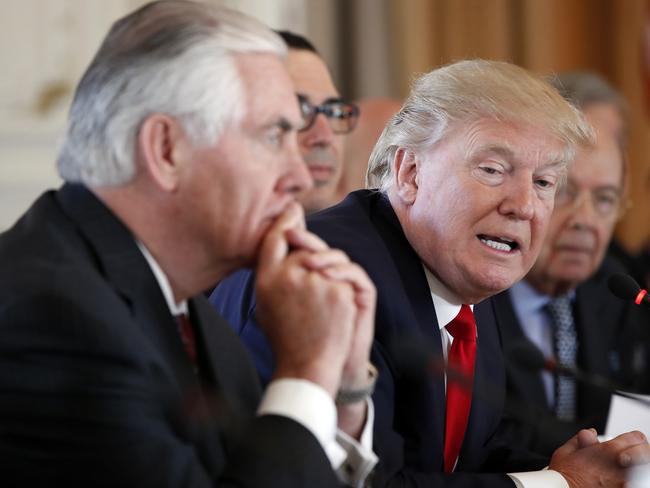
US Secretary of State Rex Tillerson, meanwhile, blamed Russian inaction for helping fuel the chemical weapons attack it had reacted to, saying Moscow had failed to carry out a 2013 agreement to secure and destroy chemical weapons in Syria.
He said the United States expected Russia to take a tougher stance against Syria by rethinking its alliance with Assad because “every time one of these horrific attacks occurs, it draws Russia closer into some level of responsibility.”
“The failure related to the recent strike and the recent terrible chemical weapons attack in large measure is a failure on Russia’s part to achieve its commitment to the international community,” Mr Tillerson said on ABC America’s This Week program.
SYRIA STRIKE A ‘GAME CHANGER’
Foreign Affairs Minister Julie Bishop says the US’s response to a “horrific” chemical attack in Syria has the potential to be a “game changer” in the six-year long conflict.
Ms Bishop the US’air strike in Syria and subsequent move to send a US navy strike group to the Korean peninsula amid concerns about its missile program showed President Donald Trump’s approach to foreign policy.

“I believe that President Trump ... through his commitment to an increased military budget, to increasing the US military, has committed to a foreign policy that includes the US taking action where the UN Security Council and where other nations are unable to act,” Ms Bishop told ABC this morning.
“I think it’s quite indicative of his foreign policy that, for example, the US is now sending a number of ships to North Korea to again send a message to North Korea that it cannot continue to launch ballistic missiles in provocative acts against Japan, South Korea, the region and the world more generally.
“I think the Trump foreign policy is that those nations that are violating international law should recognise they can’t do it with impunity.”
Syrian President Bashar Al-Assad had no legitimacy as leader after turning chemical weapons on his own people but there must be a political transition plan in place for the war-torn country before he could be removed, Ms Bishop said.
Australia’s position had “hardened” against the Syrian President since the latest attack but Ms Bishop said the Turnbull Government was “very pragmatic” about the need for a political solution.
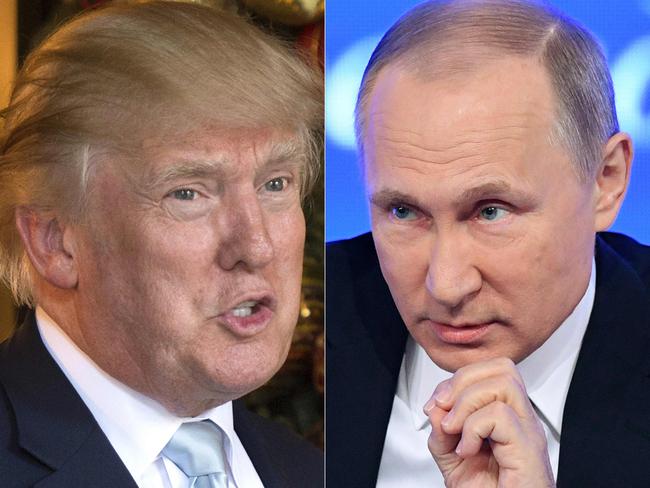
“Our position has never been that Assad has a long term role, he’s lost legitimacy,” she said.
“If you remove Assad, how do you do that if Russia and Iran are backing him, and secondly, what does the day after look like? Who is in control of the Syrian military? Who is in control of the Syrian Government? And that is the issue that is yet to be determined.”
Earlier, Ms Bishop downplayed concerns that tensions between the US and Russia, and the US and North Korea, could escalate into war.
“I hope diplomacy were overcome all of the issues we are faced with at the present,” she told Channel Seven’s Sunrise program.
“We are at a very significant and difficult and challenging time but I am hoping that the world’s diplomats will be able to find a place where we can negotiate peace in many corners of the world.”
RUSSIA ‘COMPLICIT’ IN SYRIA HORROR
US President Donald Trump’s top diplomat will accuse Russia of complicity in Syria’s war crimes during a face-to-face meeting in Moscow this week with Vladimir Putin’s foreign minister.
Secretary of State Rex Tillerson will demand that Russia yank its support from Bashar al-Assad’s bloody dictatorship over Syria, where hundreds of thousands of innocents have died in a savage six-year-old civil war, the Sunday Times of London reported.
Mr Tillerson will confront Russia with evidence that it knew about — and tried to conceal — Assad’s sarin strike last week that killed 87 people, the paper said.
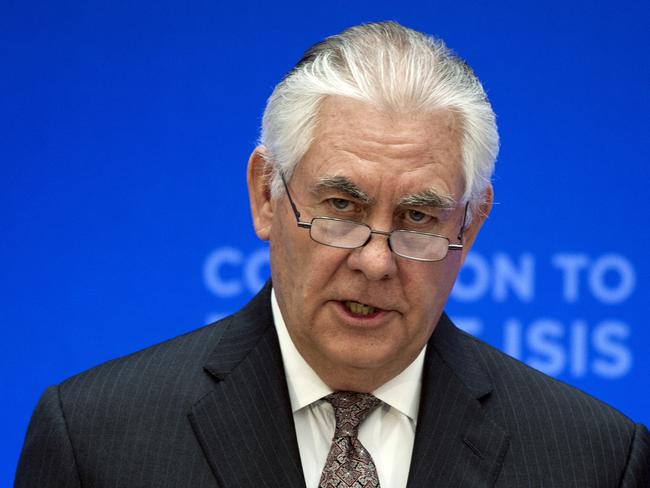
Mr Tillerson will also charge Russia with breaking its 2013 agreement to oversee the destruction of Syria’s chemical weapons, saying Moscow has “clearly failed in its responsibility” to eliminate the deadly arsenal.
In a weekend phone call with Mr Tillerson, Russian Foreign Minister Sergei Lavrov denied that the Syrian military had used chemical weapons in the attack on the town of Khan Sheikhoun, in Idlib province, on Tuesday.
Mr Lavrov said that “an attack on a country whose government fights terrorism only plays into the hands of extremists,” according to a statement from the Russian ministry.
The US and Britain strongly signalled to Mr Putin that Assad’s actions can no longer be tolerated.
The trans-Atlantic allies this weekend were composing a plan to demand that Russia halt military support for Assad and let Syria transition to a new government.
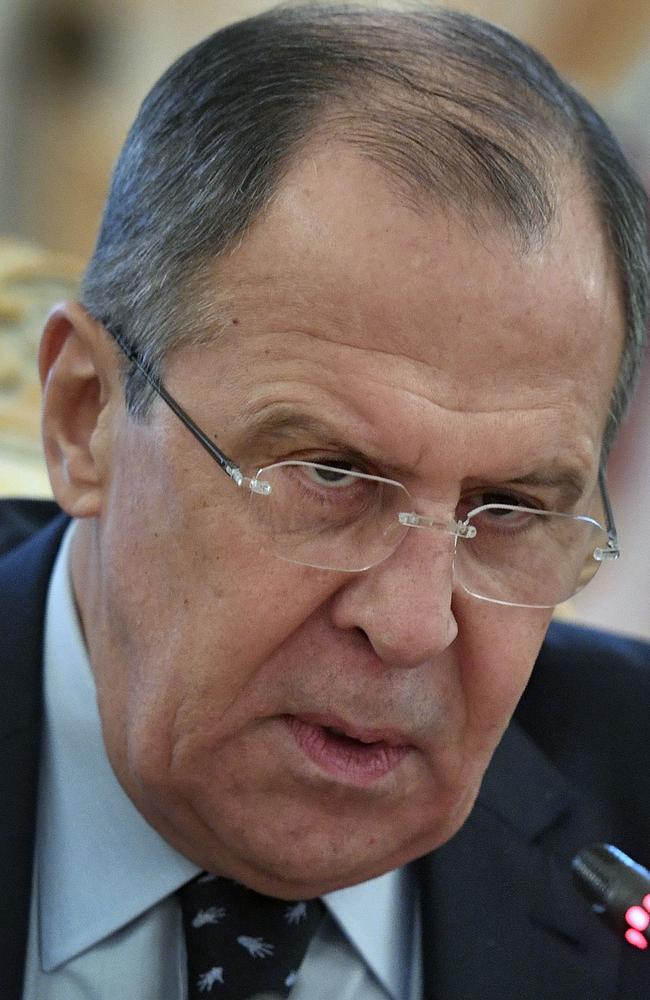
British Foreign Secretary Boris Johnson cancelled plans to meet Mr Lavrov in Moscow after conferring with Mr Tillerson and Prime Minister Theresa May on Friday.
Sir Michael Fallon, Britain’s defence secretary, said Russia is “by proxy responsible for every civilian death last week” in an essay published on Sunday.
“Someone who uses barrel bombs and chemicals to his own people cannot be the future leader of Syria,” Mr Fallon wrote. “Assad must go.”
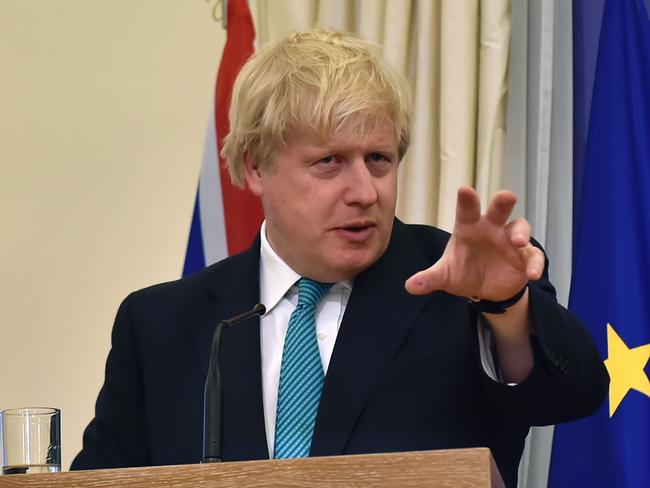
TRUMP’S OUTRAGE
Mr Trump was visibly outraged when he announced the air strikes on Thursday night and condemned Assad for having “choked out the lives of helpless men, women and children,” and adding that “no child of God should ever suffer such horror.”
The president was deeply moved by the plea of Kassem Eid, a Syrian now living in Germany who survived a 2013 sarin-gas attack that killed about 1400 people.
Eid, who appeared on CNN on Wednesday, begged Trump to act.
“Please, Mr. President, in the name of every woman and child and elder who got killed by the Assad regime, please come and help us,” he said.
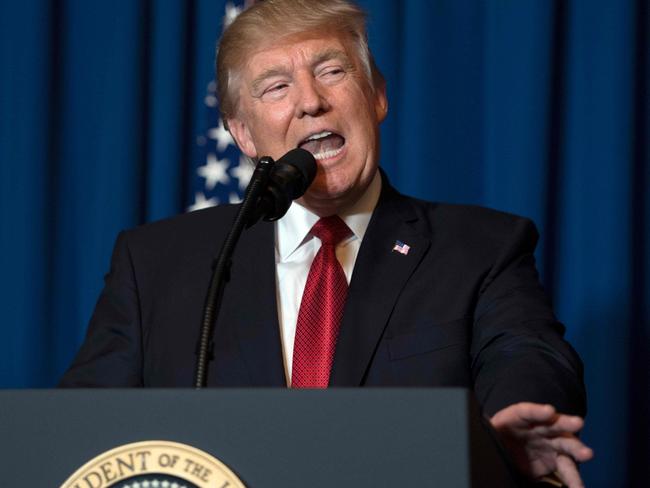
“Don’t make the same mistake that President Obama did ... Now you should show the world that those days are over.”
Sir Kim Darroch, Britain’s ambassador to the US, agreed with Eid, the Sunday Times reported.
“[Darroch] said that Mr Trump had inadvertently created a political test for himself by calling Obama weak,” a security source told the paper. “By his own logic he would be weak if he did not act.”
ALLIES PRESSED TRUMP TO ACT
King Abdullah of Jordan, who met with Mr Trump at the White House on Wednesday, also pressed Mr Trump to act, sources said.
On Thursday, Mr Trump formally authorised military strikes after arriving in Florida on air force One for a summit with Xi Jinping, the Chinese president, at Mar-a-Lago.
“I think it does demonstrate that President Trump is willing to act when governments and actors cross the line on violating commitments they’ve made and cross the line in the most heinous of ways,” Tillerson said after the US air strike.
Mr Tillerson’s trip to Moscow will follow a meeting Tuesday of G-7 foreign ministers in Italy, where he will work to solidify support for a motion censuring Russia.
“President Trump was able to do in two days what President Obama could not do in six years,” said Riad Hijab, a former Syrian prime minister who broke with Assad and joined the opposition.
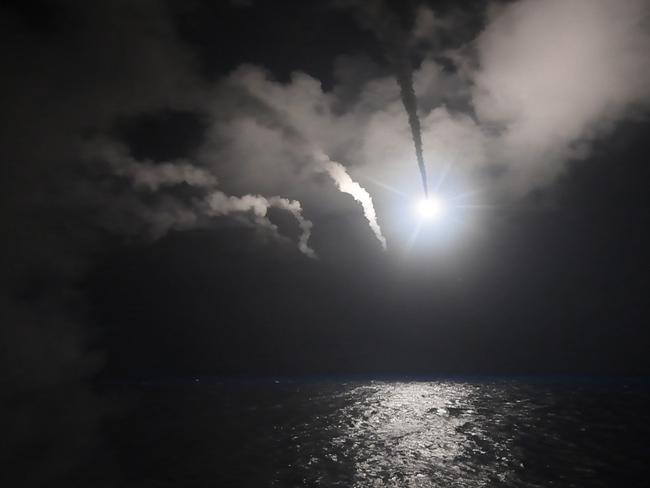
This story first appeared in the New York Post and was republished with permission.



